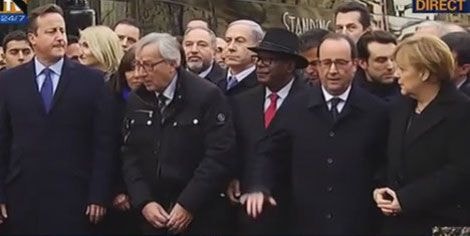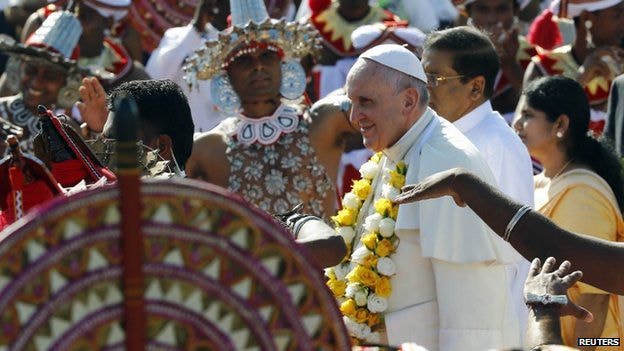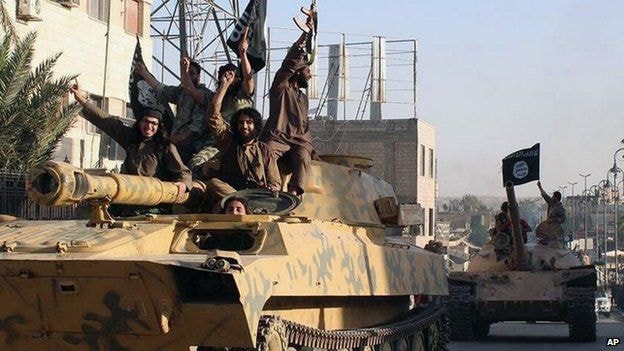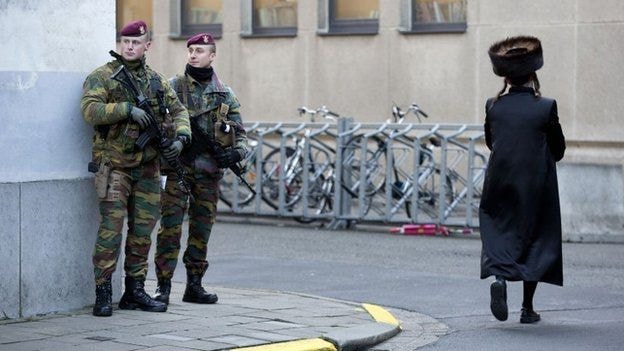The World and the War on Terror: Solidarity is Needed
(Baonghean.vn)- A series of terrorist attacks and plots taking place in many countries around the world in recent days has put the whole world at risk of continued instability.
Hundreds of thousands of people, including dozens of heads of state from Europe, North America, Africa and the Middle East, came to Paris, France to participate in a historic march demonstrating solidarity, love for peace and anti-terrorism. Pope Francis, with his message of religious harmony during his visit to Asia this time, showed that in the fierce war, there is no other way but for nations, peoples and religions around the world to unite.
| RELATED NEWS |
|---|
 |
| Heads of state attended the march in Paris. Photo: AFP |
 |
| Pope Francis is welcomed in Sri Lanka's capital Colombo. Photo Reuters |
Wave of terrorism and the transformation of the self-proclaimed Islamic State (IS)
No longer limited to ethnic and religious conflicts within each country, the world is truly facing an extremely strong wave of terrorism.
The emergence of the self-proclaimed Islamic State (IS) has created a threat not only in Iraq and Syria but also globally. International media and observers have noted that the self-proclaimed Islamic State (IS) is much more dangerous than Al-Qaeda or other terrorist organizations.
The biggest ambition of the self-proclaimed Islamic State (IS) is to establish a separate state to control the entire Muslim world. That state is called the “caliphate” and will be led by strict Sharia Law. The self-proclaimed Islamic State (IS) has many features of a regular army with a centralized and unified command system, high discipline, good fighting spirit and building a self-sufficient economic system during wartime thanks to extremely abundant financial resources. Currently, many areas occupied by the self-proclaimed Islamic State (IS) have large gas fields and oil wells, helping to ensure an abundant financial supply for this force. With a method of operation similar to the terrorist organization Al-Qaeda but more brutal and strategic, the self-proclaimed Islamic State (IS) has occupied large areas of land in the Middle East. This force currently controls one-third of Iraq and Syria, along with many areas in Yemen, Morocco, Tunisia, Algeria and Egypt's Sinai Peninsula...
 |
| The army of the self-proclaimed Islamic State (IS). Photo: AP |
Al-Qaeda groups in Africa and Southeast Asia have shown their support for the self-proclaimed Islamic State (IS) in various ways. More dangerously, the self-proclaimed Islamic State (IS) has skillfully used social networks for propaganda purposes. So far, there is no official source on the number of members of the self-proclaimed Islamic State (IS), but most figures range from 50,000 to 200,000, many times higher than the initial figure of about 30,000 fighters. Notably, among these are about 20,000 foreign fighters from all continents, including the US and Europe. These fighters are likened to "time bombs" once they are sent by the self-proclaimed Islamic State (IS) to carry out bombings in their home countries.
A worrying fact is that despite its extremely brutal methods of operation and particularly extremist ideology, the self-proclaimed Islamic State (IS) is increasingly receiving widespread support from extremist organizations and individuals around the world. The number of people following the spirit of the Islamic State (IS) and expressing support for jihad on social networks is constantly increasing, not only in countries with a large Muslim population but also across continents from the Middle East, Asia, Africa to Europe and America. Widespread support has created a constant threat to governments on all continents.
The war on terror
In late 2014 and early 2015, the international community was shocked by the wave of terrorism that increased dramatically with a series of attacks, hostage-takings and brutal massacres by the terrorist networks Al-Qaeda, Taliban, Boko Haram... taking place in many places, especially in Pakistan, killing and injuring hundreds of people, most of whom were innocent children. Then the suicide attack in the area bordering Iraq's Anbar province, where IS is controlling most of the area on January 5, killed three border guards, including General Oudah al-Belawi, commander of the northern border operations in Saudi Arabia. The King of Saudi Arabia assessed that this was not a normal attack but showed the ambition to occupy the two "Islamic Holy Lands" Mecca and Medina of the self-proclaimed Islamic State (IS), forcing the country to build a nearly 1,000m long fence and a system of dividing trenches.
Most recently, the shooting at the Charlie Hebdo newspaper office left 12 people dead and many others injured; another shooting near the capital Paris left a policewoman dead; two simultaneous kidnappings in Paris and its suburbs - considered the most brutal terrorist attacks in this country in the past half century. After France, terrorist plots and terrorist threats were discovered and suppressed in many countries such as the US, Germany, Belgium... raising deep concerns about the risk of terrorism that can happen anywhere, at any time, threatening the lives and lives of people around the world.
 |
| Security increased in Belgium. Photo: BBC |
To combat the wave of terrorism, many countries have introduced tough measures and increased security. Immediately after the terrorist attacks, France sent thousands of additional troops to Paris. To prevent the wave of its citizens joining jihad, on January 14, the German government announced that those suspected of wanting to go abroad to participate in Islamic jihad would have their German identity cards revoked.... Many other European countries such as Belgium, Greece... have implemented a series of moves to prevent terrorist acts by those returning from the self-proclaimed Islamic State (IS).
Message of solidarity
Never before have so many powerful figures from the international political world gathered together to march shoulder to shoulder after an event in a single country like the anti-terrorism march in Paris, the capital of the French Republic on January 10. More than 44 leaders from countries from Africa, the Middle East, Europe, 12 heads of international organizations and all presidents of European organizations and agencies. They were even representatives of countries with conflicting interests such as Israeli Prime Minister Benyamin Netanyahu and Palestinian President Mahmoud Abbas; Russian Foreign Minister Sergey Lavrov and Ukrainian President Petro Poroshenko. From the city of lights, Paris, to the port city of Marseille, millions of people regardless of age, skin color, ethnicity, religion joined together in the historic march, remembering the victims of the three days of horrific terrorism and united in their determination to fight against extremism. This is of great significance, demonstrating the sharing of the tragedy of France as well as the determination and solidarity of the international community in this fierce battle. The whole world is fighting together!
During his trip to Asia, Pope Francis made a surprise visit to a temple in Sri Lanka and called for unity with other religions to heal the wounds of war in this multi-religious country. The head of the Vatican also visited mosques during his trips to Istanbul - Türkiye and Jerusalem - Israel. The message of religious unity was delivered by Pope Francis at a time when the whole world was speaking out against terrorism and also at a time when there was fierce controversy over the cover of Charlie Helbo magazine continuing to publish a caricature of the Prophet Mohammed with the words "All is forgiven" showing that the leader of the world's largest religion wants to move towards unity and harmony among religions in the world to have a peaceful and happy life.
Most recently, US President Barack Obama will invite allies to a security summit in Washington in mid-February 2015 to discuss measures to prevent violent extremism. White House spokesman Josh Earnest said that recent terrorist attacks in Sydney, Ottawa and Paris were factors that prompted the need for a meeting of world leaders. The goal of the summit is to highlight the efforts of the US and the international community to prevent extremists and their supporters from "recruiting" or luring individuals to carry out attacks in the future.
Thus, the message of solidarity in the fight against terrorism has been affirmed and received the response of many people, national, international and religious leaders. Not only stopping at messages or marches, in the near future there will be solutions discussed to come to specific actions against terrorism. Not only iron walls, military but also fences built in the spirit and hearts of people will be the most solid fortress to prevent terrorists from having the opportunity to penetrate.
Huong Giang
(Provincial Radio)






